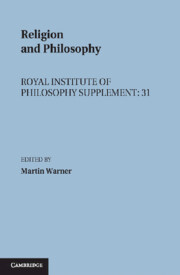Religion and Ethics
Published online by Cambridge University Press: 04 August 2010
Summary
It was, I believe, Thomas Arnold who wrote: ‘Educate men without religion and all you make of them is clever devils’. Thus the Headmaster of one famous school summarized pithily the view of the relationship between religion and ethics which informed educational theory and practice in this country for at least a further century. There is a confusion of two different assumptions usually to be found in this context. The first is that religious belief can provide an intellectual foundation (logical, or epistemological, or sometimes both) for moral belief; the second is that the effect of religious teaching is to improve behaviour according to the norms of some particular set of moral beliefs.
The second assumption offers too many hostages to fortune if it is construed as implying a one-to-one causal relationship, not to be vulnerable to a whole range of specific counter-examples. Thus there are examples of kind humanists and good atheists who clearly do not depend upon religious beliefs being either causes of, or reasons for, the goodness of their deeds. Equally there are all too many examples of evidence of the the activities of a worm at the moral core of piety, examples even of religious zeal giving rise to hatred or cruelty. It has been argued that in a less crudely individualistic fashion the social context of religious practice can provide nurture and support for good moral practice, but this is a rather vague notion unless it is refined significantly.
- Type
- Chapter
- Information
- Religion and Philosophy , pp. 123 - 146Publisher: Cambridge University PressPrint publication year: 1992
- 1
- Cited by

